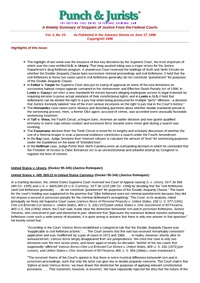Loaded on
June 1, 1996
published in Punch and Jurists
June 17, 1996
The defendant in this case was convicted of various RICO and Hobbs Act charges and, appealing pro
se, he challenged the convictions on the grounds that the Government had failed to prove the existence
of two "predicate acts" as required for a RICO conviction. He argued that the sole …
Loaded on
June 1, 1996
published in Punch and Jurists
June 17, 1996
Faced with a rather clear violation of a district court's order that the Government provide the defendants in this case with the substance of any statements made by the defendants before trial, the Court determined that the violation was not sufficient to warrant reversal. It observed that if, under …
Loaded on
June 1, 1996
published in Punch and Jurists
June 17, 1996
Any lawyer who has ever attempted to persuade a judge at sentencing that his client suffered from some physical or mental ailment that ought to qualify him for a downward adjustment in his sentence, knows how rigid the courts are on insisting that the ailment be indisputably documented and …
Loaded on
June 1, 1996
published in Punch and Jurists
June 17, 1996
Court affirmed the proposition that if the court finds that the defendant had either the intent or capacity to deliver the full amount of drugs under negotiation, then that amount must be included in the drug quantity calculation (Id., at 497).
Loaded on
June 1, 1996
published in Punch and Jurists
June 17, 1996
Here the Court vacated a panel's prior decision holding that a thermal image scan violated the Fourth Amendment, on the grounds that there were ample other reasons to support the search, making it unnecessary to reach the constitutuional issue.
This decision is particulary noted for Judge McKay's dissent …
Loaded on
June 1, 1996
published in Punch and Jurists
June 17, 1996
In this case the Eighth Circuit joins a growing number of courts that have held that the Sentencing Commission exceeded its statutory authority by defining, in Guideline Amendment No. 506, "offense statutory maximum" to mean only the unenhanced maximum term of imprisonment. The Government, on a cross appeal, insisted …
Loaded on
June 1, 1996
published in Punch and Jurists
June 17, 1996
Here the Court held that the district court did not abuse its discretion by refusing to grant the defendant's request for a hearing outside the jury's presence on the Government's discovery violations.
One of the issues dealt with in this case is whether a defendant has a right …
Loaded on
June 1, 1996
published in Punch and Jurists
June 17, 1996
Here the Court held that law enforcement officers were entitled to qualified immunity with respect to claims of the use of excessive force.
Loaded on
June 1, 1996
published in Punch and Jurists
June 17, 1996
Case held that disclosure to a probation officer did not satisfy the requirements of the safety valve disclosure obligations because the Probation Officer is not part of "the Government" for purposes of that section.
Here's still another case dealing with the "safety-valve" exception contained in 18 U.S.C. § …
Loaded on
June 1, 1996
published in Punch and Jurists
June 17, 1996
The Court also held that the factors a district court should consider in determining if a sanction is appropriate are (1) the reasons the Government delayed producing the requested materials, including whether or not the Government acted in bad faith when it failed to comply with the discovery order; …
Loaded on
June 1, 1996
published in Punch and Jurists
June 17, 1996
Case held that disclosure to a probation officer did not satisfy the requirements of the safety valve disclosure obligations because the Probation Officer is not part of "the Government" for purposes of that section.
Here's still another case dealing with the "safety-valve" exception contained in 18 U.S.C. § …
Loaded on
June 1, 1996
published in Punch and Jurists
June 17, 1996
Here's a surprising Guideline case that deals with the calculation of "loss" under U.S.S.G. §§ 2B1.1 and 2F1.1. In this case the defendant was caught crossing the border with 17 counterfeit credit cards that had a combined available credit limit of some $80,000. The defendant pled guilty to unlawful …
Loaded on
June 1, 1996
published in Punch and Jurists
June 17, 1996
Perhaps it pays to have been a Special Agent of the DEA when charged with a crime. Here, the defendant was such a Special Agent until she was indicted and charged with embezzling monies from a DEA slush fund and with conspiracy to possess crack and cocaine. The jury …
